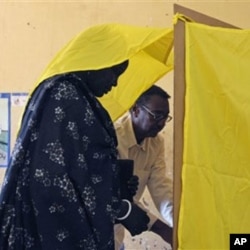This is Part 1 of a 5-part series: Strengthening Governance in Africa
Go to Part: 1 / 2 / 3 / 4 / 5
Africa has been making increasing strides in economic growth over the past two decades. Part of the credit goes to donors and agencies that work to strengthen the governmental and economic structures needed to build modern economies.
Among them is the African Capacity Building Foundation (ACBF), a 20-year-old agency whose board of governors includes representatives of African governments, the World Bank and IMF, the UN Development Program and the African Development Bank.
The executive secretary of the foundation, Frannie Leautier, says the ACBF works with universities to help train specialists in the public and private sector.
“So, for example, we work with Makerere University in Uganda, which trains people from 25 African countries who come for degrees in economic policy and management or for short-term training in specific skills to improve public sector skills.
“[One country that has] used this well,” she continues, “is Uganda itself. Through (our) training program and through an autonomous think tank called the Economic Policy Research Center, we were able to generate a cadre of people who have gone to work at the Central Bank and the Ministry of Finance and have invested in developing policies that have had huge success -- for example in transparency in decentralized spending, which had quite important results for the country.”
In West Africa, the ACBF has worked with a network of universities, including the University of Burkina Faso, that have trained up to 30 percent of civil service workers in francophone West Africa. A new program called the African Institute of Governing with Integrity teaches ethics and accountability.
One of the foundation’s main functions is working with countries recovering from conflict. It was one of the first international agencies to get involved in rebuilding Rwanda after civil war and genocide 16 years ago.
Leautier says leaders in such countries have special requirements:
“They need to be able to pull society together according to a common vision, which means skills that can include diverse opinions, skills that can keep people together and at the same time can strike in a common direction and move forward,” she says.
“[They also must have] the capacity to negotiate and manage tensions as they arise, because even after conflict, there are still a lot of flares.” And, they must be able to put into practice pragmatic programs that show people the promise of peace. If not, a country could return to war.
Last November, the government of Sudan invited the ADBF and other stakeholders, including the Africa Development Bank, to discuss strengthening institutions in southern Sudan.
“Our board approved a 2.5 million dollar grant to start up skills building,” explains Leautier, “focusing on what skills exist and on what skills will be needed, with specific attention to the appropriate management of revenues from the natural resources, so those lessons learned from other countries can be embedded and the country can be managed well and transparently for its stability in the long run.”
As in other countries, a long-term plan backed by the Africa Capacity Building Foundation will include all stakeholders that are often overlooked in development, including women, the private sector and civil society.
Technical experts from AFCB and neighboring countries are brought in to evaluate the plan to ensure it includes best practices.




